Northern Lakes Canoe Base
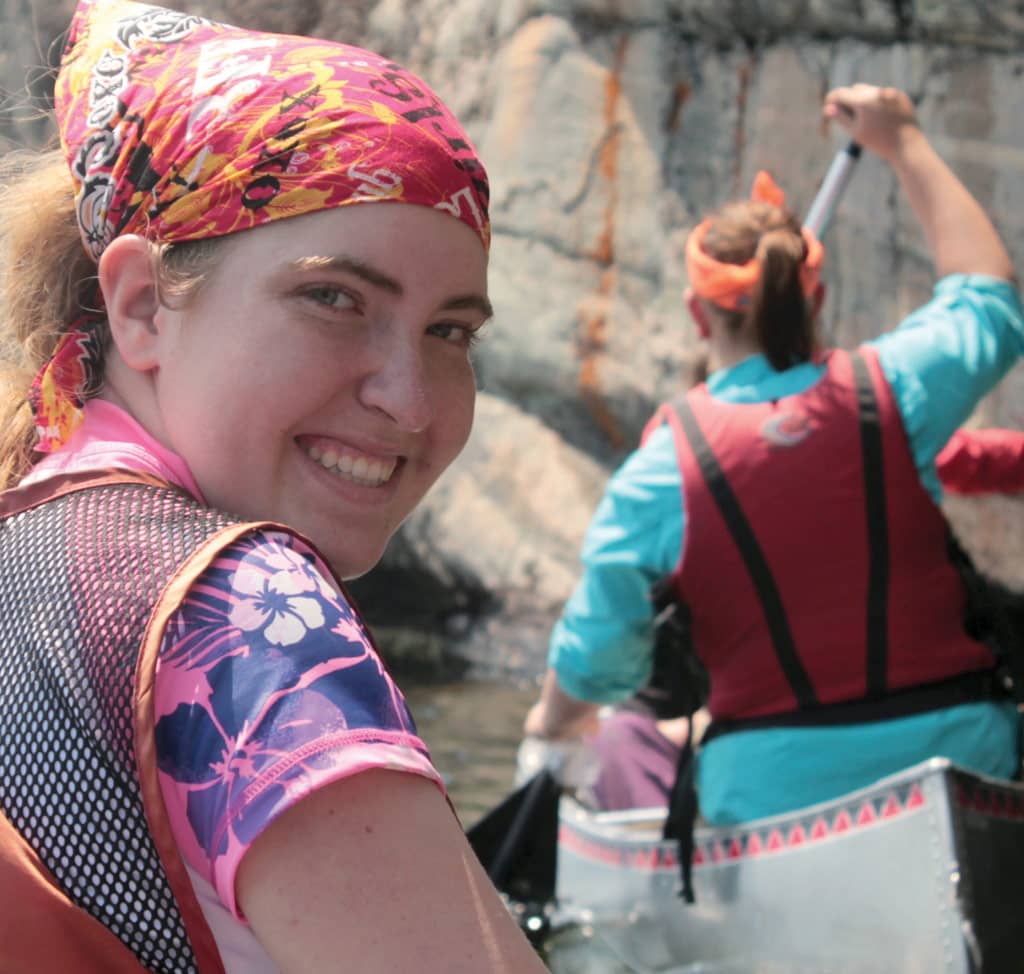
by Alissa Johnson
Picture the Girl Scouts, and it’s likely that young girls selling cookies come to mind. And while that can be part of the experience, Northern Lakes Canoe Base is offering up a very different image of what it can mean to be a Girl Scout: girls working together to meet the challenges of wilderness canoe tripping. Paddling against headwinds. Crossing muddy portages. Starting campfires in the rain. Exploring and getting to know a true wilderness area. Sitting around that fire at night, proud of their accomplishments and enjoying new friends. Based outside of Ely, Minnesota, Northern Lakes Canoe Base offers wilderness canoe trips exclusively for girls, whether they come on their own, with a friend, or as part of their troop.
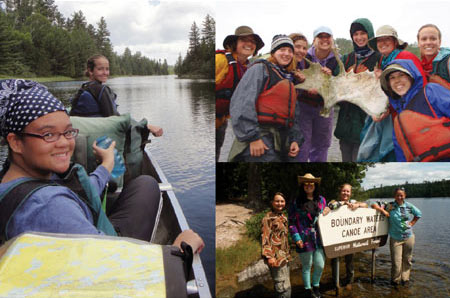
“We are trying to show girls that when you turn 12, that’s when girl scouting gets really good. With all those skills you learned as a Brownie, you’re ready to take the next step and go on an adventure,” says Ann McNally, Summer Program Director for Northern Lakes Canoe Base. And adventure is something that girls are seeking. “A lot of councils are realizing that girls are seeking adventure and that they need to meet this need, so they’re calling us because to my knowledge we’re the only program exclusively for girls that offers wilderness canoe trips in the Boundary Waters.”
Other programs in the region offer girls trips, but at Northern Lakes Canoe Base the entire experience is for girls only. Campers between the ages of 12 and 18 (as well as troop leaders and adults) go on three- to ten-day canoe trips in the Boundary Waters Canoe Area Wilderness and Quetico Provincial Park. And whether they come alone or with their troop, they get to be involved in every aspect of their trip. From learning to carry a canoe to helping cook, guides will be on hand to help but there’s no one who will step in and do things for them just because they are girls.
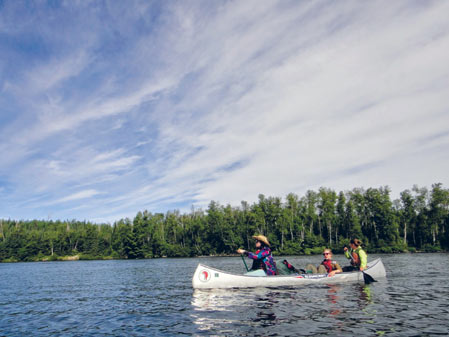
Every girl learns proper paddling strokes and techniques needed for wilderness travel into the BWCAW and Quetico Parks. All photos by and courtesy of Caroline Rose.
“The social norm is that guys fix the tire on the car when it gets flat or are up on the roof fixing gutters. I know there are exceptions to that, but that’s the social norm. So for girls to be in a situation that’s challenging, and to have it be girls only, they always rise to the challenge,” McNally says. “They really learn the power of teamwork because often the challenges they face are best solved if they put their minds together.”
That kind of empowerment begins with teaching the girls wilderness travel skills. At the canoe base, guides show them the techniques they’ll need on trail and give them a chance to practice. They also tailor expectations to the girls’ ages, size, and experience. As McNally puts it, the guides would never expect at 12-year-old girl to flip up a 60-pound aluminum canoe on her own. But with three people and an emphasis on things like communication and good footing, it is possible for young girls to flip up a canoe and then have one of them carry it. From there, success is up to the girl under the canoe. “If a girl wants to take five steps and take a break, we’re totally cool with that,” McNally says.
Yet it’s common for girls to set their own goals as they become more comfortable with trail life and learn that they’re capable of more than they realized. This summer will be Eliza Vistica’s fourth as a guide at Northern Lakes Canoe Base, and she sees it all the time. “On the first day we teach them how to carry canoes and a lot of times they’re very hesitant because canoes are very heavy, and they’re waiting for you to instruct them. The last day, kids are fighting to carry the canoe and saying, ‘I carried the canoe 30 rods yesterday, so I’m going to carry it 50 rods today,’” she says.
That transformation from hesitant to confident isn’t limited to portaging. Campers routinely go from never having slept in a tent and being uncomfortable sitting on the ground to picking up insects to study them and comfortable sitting in the dirt. They know what it’s like to sit around a campfire at night and feel great about their accomplishments, and according to Vistica, it’s that hands-on experience that really makes the difference in the girls’ confidence.
“When kids are in their everyday life, people tell them they can do anything—you can do whatever you want. In the wilderness—in our setting—we’re able to show them rather than tell them. We have to get this fire started, we have to get across the portage, and no one can do it but us,” she said. “At the end of a long, windy day paddling against headwinds and trying to get across portages, when you’re sitting around the fire with them it’s a crazy feeling. They just showed themselves that they can do it, and that experience will be with them forever.”
Vistica believes that’s the kind of experience girls need. During the school year, she taught environmental education in Georgia, sometimes working with fourth and fifth graders, and sometimes working with seventh and eighth graders. Among the younger students, she didn’t see much difference between girls and boys. They were all confident and excited to try new things. Among the middle school students, the girls’ confidence was much lower. When faced with something new, they were more likely to say, “I can’t do that. Will you do it for me?” By contrast, girls who go through Northern Lakes Canoe Base adopt a more open attitude: “I’ve never done that, and I can’t wait to learn.”
In addition to fostering that kind of personal growth, McNally explained that Northern Lakes Canoe Base emphasizes wilderness values and Leave No Trace principles—and it goes beyond reading the rules and regulations for wilderness areas. Groups learn how their behavior affects other canoeists’ experiences, and why it’s important not to sing at the top of their lungs at campsites or litter or exceed group size limits. They also learn about the history of the wilderness areas.
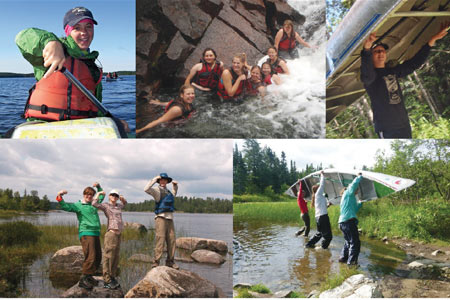
When exploring the wilderness girls discover things they’d never find in the city. Girl Scouts realize their own strengths on canoe trips through Northern Lakes Canoe Base.
“We talk about how, at one point, there was a movement to have resorts throughout the area and a road to every lake, and now the wilderness is threatened by mining. This is a treasured resource. It’s not a national park, a state park or a county park,” McNally says. “Most of our participants have never been to a wilderness area and only know the colloquial term for it, like walking through a forest in their town and thinking it’s wilderness. We make sure every girl, on the day she arrives, understands that this is a federally designated protected area, and we have to do our part to preserve it for generations to come.”
McNally hopes that understanding will stay with them. Many girls go on to join college outing clubs or take trips of their own. “That word ‘wilderness’ has special meaning to them and we hope they’ll do what they can after our trips to preserve wilderness areas for all,” McNally said.
And perhaps that emphasis reveals how the Northern Lakes Canoe Base experience may in fact be similar to selling cookies—like all Girl Scout programs, it emphasizes the development of skills and values that will serve girls throughout their lives. That’s something very much in keeping with the Girl Scout experience.
Learn more about Northern Lakes Canoe Base
This article originally published in Quetico Superior Wilderness News >



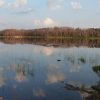
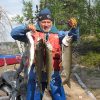












How wonderful! Great information. Well spoken McNally leaves me wanting to grab a paddle and sign up for a canoe trip!!